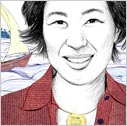"Stories Are Far More Important Than Possessions": A Conversation with Edmund de Waal

Written in a tender, poignant voice, The Hare with Amber Eyes is an exquisite history of an Old World family, of the society in which they lived, and of their beloved objects. It’s a tale of art and wealth, of survival and the bittersweet memories of family heirlooms lost and found. [Read Andrew Holgate’s review here. — The Editors]
De Waal talks about connecting with readers, Proust, and the “odd correspondence between inheriting a story and inheriting an object,” among other things, with Discover Great New Writers:
In the prologue you write, “Owning this netsuke — inheriting them all — means I have been handed a responsibility to them and to the people who have owned them. I am unclear and discomfited about where the parameters of this responsibility might lie.” Do you feel that the writing of this book — the tribute it pays to these objects and these people — has fulfilled that responsibility?
Emphatically yes! Not through the research and writing of the book however, but through the experience of the last two years, of travelling around the world talking about it. The encouters I have had with readers in different countries have made me feel that this very particular story has resonances with many other people’s histories of exile and diaspora.
During your research, you discovered that your forebear, Charles Ephrussi, was Proust’s model for Charles Swann. In the wake of such an unbelievable discovery, was it difficult to move forward with your project as conceived? How did this knowledge change you and your writing?
Can you imagine how difficult it is to write a book about memory with Proust in it? It was an exhilarating discovery, as I have always loved Proust, but it also discomforted me: I felt that I had to find a way of weaving his story into my own. I had to be careful not to let my descriptions of Belle Epoque Paris take over. It could have turned into a book saturated with soiree and salons and that was a danger I had to avoid. The most comic reaction I had to the book was in Paris, where all the French critics hated an Englishman claiming any connection to Proust at all.
During your book tour last October, you spoke at the Palais Ephrussi in Vienna. What is this like? A homecoming to a place that was never, personally, your home?
It was extremely emotional. I went with my wife and sons, and with my father. It was a place he knew well in childhood and so it was a real homecoming for him. It gave him the chance to take my children round and show them the places I had described in the book. There were about 400 people in the inner courtyard and it was pretty daunting. I talked about restitution as an act of bringing a family home to a place from which they were thrown out: it is also possible to restitute stories as well as possessions.
Are stories more important than objects in a family legacy? How are they related?
Stories are far more important than possessions. But there is an odd correspondance between inheriting a story and inheriting an object. Stories have a kind of shape to them and in their transmission carry strong inflections of how they were created. Family stories are really interesting, you inherit them. It is also possible to inherit silences: places in family histories where no one wants to go, but sometimes by holding objects you allow those silences to come alive.
Having written this book, what do you think one can learn about a person from his possessions?
A huge amount. I’m always fascinated by meeting people who say they don’t collect something. It often means that they are assiduous in getting rid of objects from their lives, and this can be as revealing as an apartment stuffed with paintings and furniture and things. I dont believe that it is possible to be in the world and not connect on some level through touch to the things that surround us.
Who have you discovered lately?
I’m reading a lot of contemporary poetry at the moment and have loved Memorial by Alice Oswald and Rain by Don Paterson. I’m feeling liberated from reading novels about middle Europa and have particularly enjoyed Katherine Boo’s Behind the Beautiful Forevers: Life, Death and Hope in a Mumbai Undercity. The latest Hilary Mantell Bring up the Bodies was as good as Wolf Hall, which is saying something.
(Katherine Boo’s masterpiece Behind the Beautiful Forevers is a Spring 2012 Discover Great New Writers selection.)
Cheers, Miwa

Miwa Messer is the Director of the Barnes & Noble Discover Great New Writers program, which was established in 1990 to highlight works of exceptional literary quality that might otherwise be overlooked in a crowded book marketplace. Titles chosen for the program are handpicked. by a select group of our booksellers four times a year. Click here for submission guidelines.